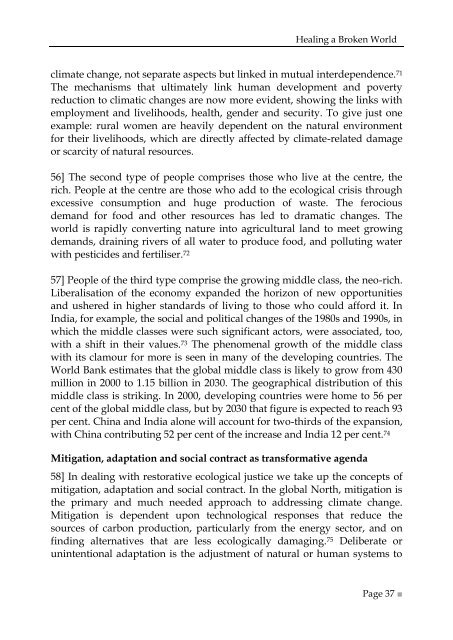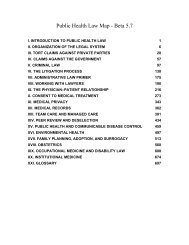Healing a Broken World - Society of Jesus
Healing a Broken World - Society of Jesus
Healing a Broken World - Society of Jesus
Create successful ePaper yourself
Turn your PDF publications into a flip-book with our unique Google optimized e-Paper software.
<strong>Healing</strong> a <strong>Broken</strong> <strong>World</strong><br />
climate change, not separate aspects but linked in mutual interdependence. 71<br />
The mechanisms that ultimately link human development and poverty<br />
reduction to climatic changes are now more evident, showing the links with<br />
employment and livelihoods, health, gender and security. To give just one<br />
example: rural women are heavily dependent on the natural environment<br />
for their livelihoods, which are directly affected by climate-related damage<br />
or scarcity <strong>of</strong> natural resources.<br />
56] The second type <strong>of</strong> people comprises those who live at the centre, the<br />
rich. People at the centre are those who add to the ecological crisis through<br />
excessive consumption and huge production <strong>of</strong> waste. The ferocious<br />
demand for food and other resources has led to dramatic changes. The<br />
world is rapidly converting nature into agricultural land to meet growing<br />
demands, draining rivers <strong>of</strong> all water to produce food, and polluting water<br />
with pesticides and fertiliser. 72<br />
57] People <strong>of</strong> the third type comprise the growing middle class, the neo-rich.<br />
Liberalisation <strong>of</strong> the economy expanded the horizon <strong>of</strong> new opportunities<br />
and ushered in higher standards <strong>of</strong> living to those who could afford it. In<br />
India, for example, the social and political changes <strong>of</strong> the 1980s and 1990s, in<br />
which the middle classes were such significant actors, were associated, too,<br />
with a shift in their values. 73 The phenomenal growth <strong>of</strong> the middle class<br />
with its clamour for more is seen in many <strong>of</strong> the developing countries. The<br />
<strong>World</strong> Bank estimates that the global middle class is likely to grow from 430<br />
million in 2000 to 1.15 billion in 2030. The geographical distribution <strong>of</strong> this<br />
middle class is striking. In 2000, developing countries were home to 56 per<br />
cent <strong>of</strong> the global middle class, but by 2030 that figure is expected to reach 93<br />
per cent. China and India alone will account for two-thirds <strong>of</strong> the expansion,<br />
with China contributing 52 per cent <strong>of</strong> the increase and India 12 per cent. 74<br />
Mitigation, adaptation and social contract as transformative agenda<br />
58] In dealing with restorative ecological justice we take up the concepts <strong>of</strong><br />
mitigation, adaptation and social contract. In the global North, mitigation is<br />
the primary and much needed approach to addressing climate change.<br />
Mitigation is dependent upon technological responses that reduce the<br />
sources <strong>of</strong> carbon production, particularly from the energy sector, and on<br />
finding alternatives that are less ecologically damaging. 75 Deliberate or<br />
unintentional adaptation is the adjustment <strong>of</strong> natural or human systems to<br />
Page 37 ■
















